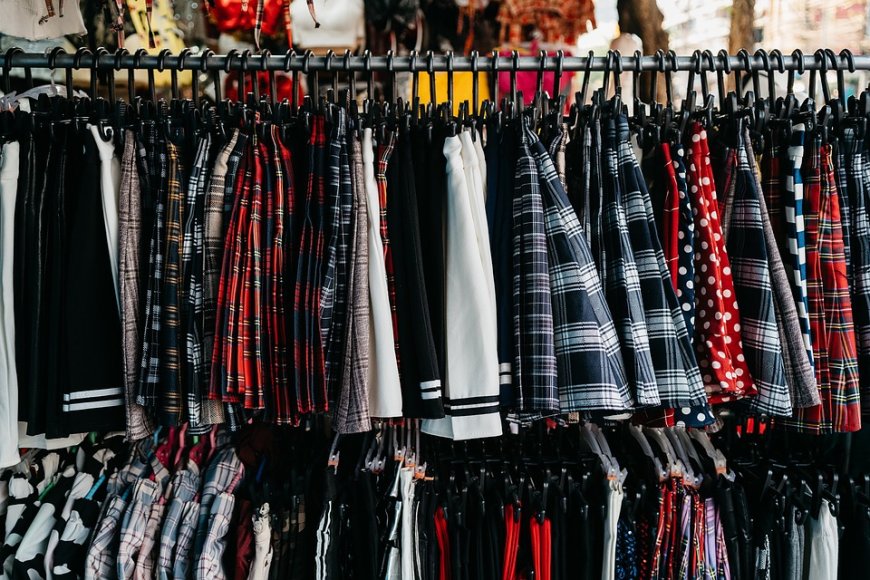Why should we care about fashion and clothing?
Fashion is not just about clothing and trends; it is a powerful form of self-expression, a means to showcase our individuality and creativity.

Introduction: The importance of fashion in our daily lives
Whether we realize it or not, fashion plays an integral role in our daily lives, shaping how we present ourselves to the world and influencing the way others perceive us. But why should we care about fashion and clothing?
In this article, we will delve into the historical significance of fashion, explore its impact on self-expression and identity, examine its role in the global economy, discuss sustainable fashion practices, and even uncover how fashion can be used as a form of activism. So grab your favorite outfit and let's dive into the captivating world of fashion!
Historical significance of fashion and clothing
Fashion and clothing have always played a significant role in human history. From ancient civilizations to modern societies, the way people dress has been an important aspect of cultural expression, social status, and personal identity.
In ancient times, clothing was not just about covering one's body but also served as a symbol of power and social standing. For example, in ancient Egypt, pharaohs wore elaborate headdresses adorned with precious gems to showcase their wealth and authority. In feudal Japan, the kimono was not only a garment but also a reflection of one's place in society.
Throughout history, fashion trends have often been influenced by political events or societal changes. The Renaissance period saw an explosion of creativity in fashion as artists sought inspiration from classical Greece and Rome. During the French Revolution, there was a shift towards simpler attire as a rejection of aristocratic excess.
The Industrial Revolution brought about mass production techniques that made fashionable clothing more accessible to all classes. This democratization of fashion allowed individuals from different backgrounds to express themselves through their choice of attire.
Furthermore, historical figures such as Coco Chanel and Yves Saint Laurent revolutionized fashion by creating iconic designs that challenged traditional gender norms and redefined standards of beauty.
The historical significance of fashion cannot be underestimated. It reflects our evolution as societies and individuals while providing us with endless opportunities for self-expression and cultural identification.
The impact of fashion on self-expression and identity
Fashion has always been a powerful tool for self-expression and identity. The clothes we choose to wear can speak volumes about our personality, interests, and values. Whether it's a bold statement piece or a subtle accessory, fashion allows us to showcase who we are without saying a word.
Clothing allows us to experiment with different styles and looks, giving us the freedom to express ourselves in unique ways. It gives us the opportunity to step outside of societal norms and embrace our individuality. From vintage-inspired outfits that pay homage to past eras, to avant-garde designs that push boundaries, fashion offers endless possibilities for self-expression.
Through fashion, we can also connect with like-minded individuals and form communities based on shared interests. Think about how fans of specific music genres or subcultures often dress in ways that reflect their allegiance - punk rockers with leather jackets and spiked accessories or hip hop enthusiasts sporting baggy jeans and oversized shirts.
Furthermore, fashion plays an important role in shaping our identities by allowing us to align ourselves with certain social groups or causes. For example, someone who advocates for sustainable living may choose eco-friendly brands over fast-fashion retailers as a way of expressing their commitment towards environmental conservation.
On an individual level, fashion empowers us by boosting our confidence and helping us feel comfortable in our own skin. When we put on an outfit that makes us feel good about ourselves, it radiates through our demeanor and interactions with others.
In conclusion (not conclusive), fashion is not just about following trends or looking stylish; it goes beyond appearances as it influences how we see ourselves and how others perceive us. It's a means of communication that transcends spoken language - a visual representation of who we are at any given moment in time.
The role of the fashion industry in the global economy
The fashion industry is not just about clothes and accessories; it plays a significant role in the global economy. From production to retail, this multi-billion dollar industry creates jobs and fuels economic growth worldwide.
Fashion brands employ millions of people around the globe, from garment workers to designers and marketers. The manufacturing process involves sourcing raw materials, cutting and sewing fabrics, and distributing finished products. Each step along the way contributes to employment opportunities for individuals across various regions.
Moreover, the fashion industry has a ripple effect on related sectors such as advertising, media, logistics, and even tourism. Fashion events like runway shows or trade fairs attract visitors from all over the world who contribute to local economies by spending money on accommodation, dining out, shopping for souvenirs – all because of their interest in fashion.
On top of that, international trade is a key aspect of the fashion industry's impact on global economies. Countries import textiles and export finished garments or vice versa. This creates a network of interconnectedness between nations that drives economic cooperation while also highlighting each country's unique expertise in different parts of the supply chain.
In addition to its financial influence globally, the fashion industry also shapes cultural exchange. Designers draw inspiration from diverse backgrounds resulting in fusion creations that showcase various traditions and aesthetics from around the world. These collaborations promote cultural understanding while stimulating creativity.
While there are undoubtedly some negative aspects associated with fast-fashion practices such as environmental pollution or labor rights violations within certain factories operating under unsustainable conditions - it is important not overlook how much positive change can be driven by responsible practices.
The role of sustainable fashion cannot be understated when considering its impact on both local communities' well-being as well as our planet's health overall – through ethical sourcing methods while prioritizing fair wages for workers involved throughout production processes which can greatly benefit developing countries where many garment manufacturers are based.
The fashion industry goes beyond mere aesthetics; it significantly contributes to job creation , economic growth, cultural exchange and can be a catalyst for positive change. Understanding its role in the global economy is crucial to addressing its challenges and harnessing its potential for a better future.
Sustainable fashion: Why it matters
In today's world, the concept of sustainability has become more important than ever before. From renewable energy sources to eco-friendly products, people are becoming increasingly aware of the need to protect our planet for future generations. And when it comes to fashion, this awareness is no different.
Sustainable fashion refers to clothing that is made with a focus on minimizing its impact on the environment and promoting social responsibility throughout the supply chain. It considers factors such as reducing waste, using organic or recycled materials, and ensuring fair treatment of workers.
One of the reasons why sustainable fashion matters is because of its positive environmental impact. Fast fashion has contributed greatly to pollution and waste in recent years, with garments often ending up in landfills after just a few uses. By opting for sustainable alternatives, we can help reduce this waste and minimize our carbon footprint.
Not only does sustainable fashion benefit the environment, but it also promotes ethical practices within the industry. Many fast fashion brands have been criticized for their exploitation of workers in developing countries. With sustainable fashion, there is a greater emphasis on fair wages and safe working conditions for all those involved in producing our clothes.
Additionally, by supporting sustainable brands and designers who prioritize eco-friendly practices, we are sending a message to the industry that we value ethical standards over cheaply produced clothing. This demand can encourage other companies to adopt more sustainable practices as well.
Furthermore, embracing sustainable fashion allows us to express our personal style while still being conscious consumers. There are now numerous options available that offer stylish designs without compromising on sustainability. By choosing these alternatives over fast-fashion trends that quickly go out of style or fall apart after a few wears, we can build a wardrobe that lasts longer while aligning with our values.
Sustainable fashion goes beyond looking good – it’s about taking care of both ourselves and our planet. Through mindful choices in what we wear and support financially as consumers, we have the power to make a positive impact on the fashion industry and the world as a whole.
How fashion can be used as a form of activism
Fashion has the power to transcend mere aesthetics and become a powerful tool for activism. By using clothing as a means of self-expression, individuals have the ability to make bold statements about their beliefs, values, and causes they support. Fashion can be used as a visual language that speaks volumes without uttering a single word.
Activism through fashion takes many forms. It can involve wearing politically charged slogans or symbols on clothing to raise awareness about social issues such as gender equality, environmental sustainability, or racial justice. Designers themselves also play an important role in this movement by creating collections that challenge societal norms and push boundaries.
One example of fashion activism is seen in the rise of sustainable and ethical fashion movements. These initiatives advocate for responsible production practices that prioritize workers' rights and minimize harm to the environment. By choosing clothes made from recycled materials or supporting brands with transparent supply chains, consumers actively participate in promoting positive change within the industry.
Furthermore, fashion activism extends beyond personal choices; it often involves collective action. Fashion shows featuring models from diverse backgrounds challenge conventional beauty standards while promoting inclusivity and representation. Additionally, events like "Fashion Revolution Week" encourage consumers to question where their garments come from and demand greater transparency within the industry.
It's important to recognize that fashion alone cannot solve deep-rooted social issues; however, it serves as a platform for starting conversations and raising awareness on pressing matters. When combined with other forms of advocacy like education or policy changes, fashion adds another layer of visibility to these crucial topics.
Conclusion:
Fashion and clothing hold a significant place in our lives, serving as more than just items we wear. They have a rich historical significance, shaping cultures and societies throughout time. Fashion allows us to express ourselves and create our own unique identities. Beyond personal expression, the fashion industry plays a crucial role in the global economy, providing employment opportunities and driving innovation.
In recent years, there has been growing awareness of the environmental impact of fast fashion, leading to a rise in sustainable fashion practices. By prioritizing ethical production methods and materials, we can contribute to reducing pollution and waste.
Furthermore, fashion has become an important tool for activism. From promoting body positivity to challenging social norms, designers are using their creations to spark conversations about important issues.
Why should we care about fashion? Because it is not simply about looking good or following trends; it is about harnessing the power of self-expression while being mindful of our impact on the world around us. So let's embrace fashion as an art form that empowers us while striving for sustainability and positive change within the industry.











.jpg)




































